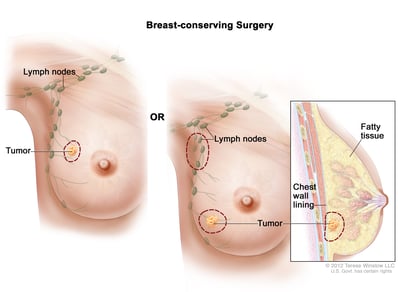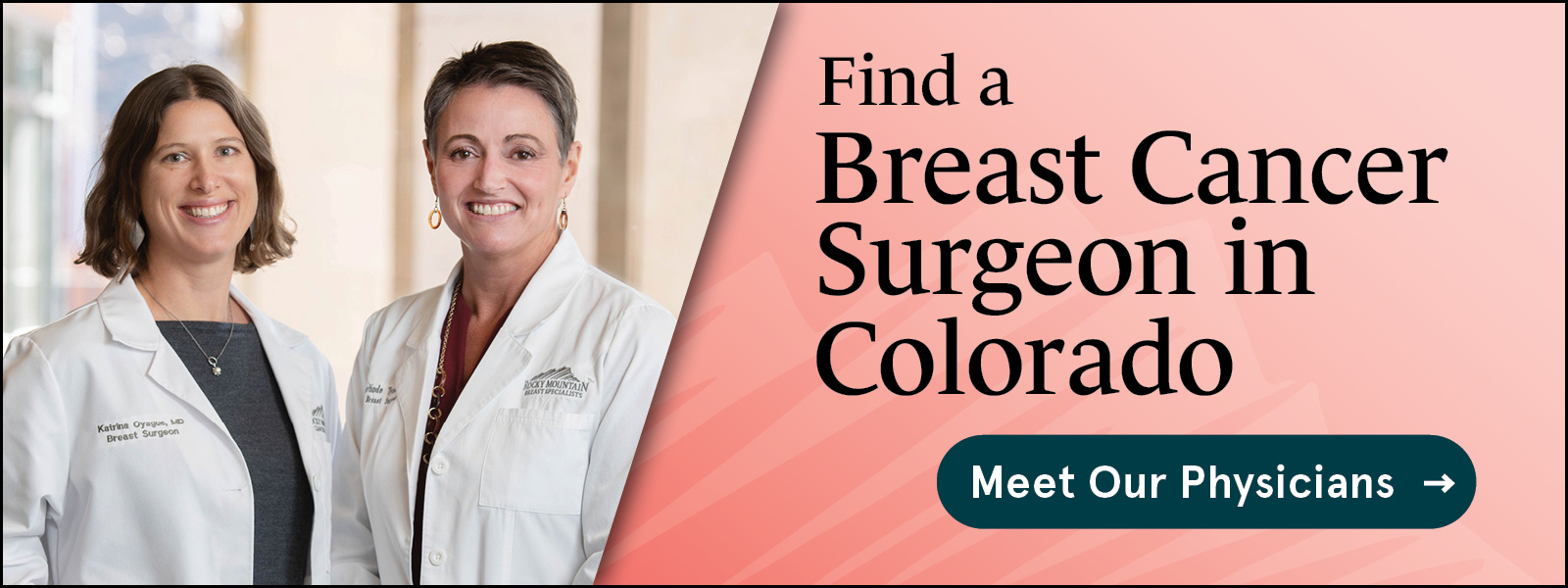Breast-Conserving Therapy for Early-Stage Breast Cancer
6 min read

A breast cancer diagnosis is a life-changing event — one that leaves women with a major choice regarding their breast cancer treatment. For those diagnosed with early-stage breast cancer, the decision may be a little easier, especially because most early-stage breast cancers do not require a mastectomy. If you have recently been diagnosed with early-stage breast cancer, you might be a good candidate for breast-conserving therapy.
What is Early-Stage Breast Cancer?
Early-stage, or localized, breast cancer means that the cancer was caught at an early point in its development — it has not spread past the breast and nearby lymph nodes. On a pathology report, early-stage breast cancer would be described as Stage 0 or Stage I (IA or IB). When caught and treated early, women with early-stage breast cancer usually have a favorable prognosis (outlook).
What is Breast-Conserving Therapy?
 Breast-conserving therapy (BCT) refers to breast-conserving surgery, also called lumpectomy, followed by radiation therapy.
Breast-conserving therapy (BCT) refers to breast-conserving surgery, also called lumpectomy, followed by radiation therapy.
Breast-conserving surgery removes the cancer, as well as a small margin of healthy tissue surrounding it while leaving the rest of the breast intact. It may also include removing lymph nodes under the arms or near the breast. Surgery is then followed up by external beam radiation therapy or internal HDR breast radiation to treat any remaining cancer cells.
While some women have no other alternative to mastectomy, those diagnosed with early breast cancer usually do. If your pathology report results show that you have early-stage breast cancer, and would like to keep most of your natural breast, then your oncologist may recommend breast-conserving therapy as your treatment plan.
The Rocky Mountain Breast Specialists (RMBS) are here to help determine the best plan for your specific breast cancer and personal goals.
Breast-Conserving Therapy: Who It’s Appropriate For
In recent years, research has shown that women with localized breast cancer have just as good of a prognosis being treated with breast-conserving therapy as women who chose to have a mastectomy. Breast-conserving therapy might be a treatment option worth considering if you:
- Have concerns about losing a breast
- Are able to have radiation therapy, and have not already had that breast treated with radiation therapy
- Have cancer in one area of the breast, or in multiple areas close enough to be removed together
- Have a tumor smaller than two inches—this may vary depending on the location of the tumor and the size of the breast
- Are not pregnant
- Are not positive for the BRCA gene mutation linked to hereditary breast cancer.
What to Expect From Breast-Conserving Surgery
If your oncologist recommends lumpectomy with radiation as part of your treatment plan, the goal will be to remove only the part of the breast that contains the cancer. How much of the breast that is removed depends on various factors, including the location and size of the tumor. Depending on your specific situation, the breast cancer surgeon may also need to remove some nearby lymph nodes. While this surgery is usually referred to as a lumpectomy, it may also be called quadrantectomy, segmental mastectomy, or partial mastectomy.
Because this surgical approach is much less invasive than mastectomy, patients often do not need to stay in the hospital overnight. Instead, it can be done as an outpatient procedure, allowing you to go home the same day. This means faster recovery — and, you’re able to move on to the radiation portion of your therapy sooner.
Proper self-care at home post-surgery will be an important part of your recovery. Before leaving the hospital, it’s a good idea to ask questions you have about:
- How to best care for the surgery site, including cleaning and bandaging the wound
- What physical activities should you avoid while you recover
- When you can start wearing a bra again
- How to shower while the wound is healing
- What signs indicate that an infection could be present
- Any special instructions regarding your prescribed medications
If you have any concerns about the recovery process, please reach out to a member of your Rocky Mountain Breast Specialists team.
Will Breast-Conserving Surgery Successfully Remove All of the Cancer?
Having concerns and wondering if breast-conserving therapy is the right option for you is understandable. After all, you want to make sure all of the cancer is removed. While lumpectomy isn’t the best option for all breast cancer patients, it can be a great option for breast cancers that are caught early. In fact, choosing breast-conserving surgery plus radiation over mastectomy to treat early-stage breast cancer does not affect your chances of long-term survival.
To ensure the best outcome of your breast-conserving surgery, the surgeon will take a small rim of normal tissue surrounding the tumor in addition to the tumor itself. This extra bit of tissue is called a margin. After surgery, this margin of tissue will continue to be closely inspected to make sure that it does not contain cancer cells. Should the oncologist suspect cancer cells are present, additional tissue may need to be removed. This procedure is called a re-excision. If cancer cells are still found in the removed tissue, it’s likely the cancer has spread to the point where a mastectomy may be needed.
Radiation Therapy After Breast-Conserving Surgery
Most patients will need radiation therapy to the breast following surgery, which will be delivered by a radiation oncologist. This treats the area where the cancer was removed and helps treat any cancer cells that could be present in the area. Small clips may be placed inside the breast during surgery to mark where the cancer was removed, so the radiation can be more precisely aimed at the correct area.
How long treatment lasts depends on the type of radiation therapy you will receive. Treatment with external beam radiation therapy is usually administered 5 days a week for 4 to 6 weeks. Conversely, HDR brachytherapy takes much less time with treatment requiring only 5 to 7 days.
Other Treatments May Be Needed to Help Prevent Breast Cancer Recurrence
If your diagnosis was hormone-positive breast cancer it’s likely that your oncologist will suggest hormone therapy after your surgery is complete. This treatment helps block the overexpression of hormones that cause your breast cancer to grow. It’s usually a pill taken daily for 5-10 years after diagnosis. This treatment does include some side effects but is proven to keep the cancer from returning for many patients.
Will I Need Breast Reconstruction After Breast-Conserving Surgery?
Depending on how much of a margin needs to be removed during a lumpectomy, or how large the tumor is, your surgical team will talk with you about your reconstruction options. A plastic surgeon will be included in the treatment planning to make sure the breasts are the same size and similarly shaped after the breast cancer removal surgery is complete. This will be discussed before the breast-conserving surgery is performed. This is because reconstruction is often done at the same time as your breast cancer surgery. Your Rocky Mountain Breast Specialists surgeon will be able to connect you with a plastic surgeon who can explain your options.
Some questions you may want to ask your breast surgeon if you are considering breast reconstruction surgery might include:
- What types of reconstructive surgery are available?
- Will reconstruction interfere with chemotherapy, radiation therapy, or any other treatment I may have?
- What is the average recovery time?
- Is reconstruction surgery recommended during the initial breast cancer surgery, or should I wait?
- What kind of changes can I expect to the breast over time?
- Should I consider surgery on both breasts to help them look alike?
Your RMBS team can provide you with other resources if you need them, including connecting you with patients who have had breast-conserving therapy.
Request a Consultation with the RMBS Team
The Rocky Mountain Breast Specialists are here to guide you through your breast cancer treatment journey. Our team includes the medical oncologists, who will typically lead your treatment planning team, as well as surgeons and radiation oncologists. They will work together to create a personalized plan that’s best for you.
Our breast cancer doctors care for patients in Denver, Colorado Springs, Boulder, and throughout the Front Range. Request an appointment at a location near you. We also offer second opinions regarding breast cancer diagnosis, surgical plans, and recommended treatment.


